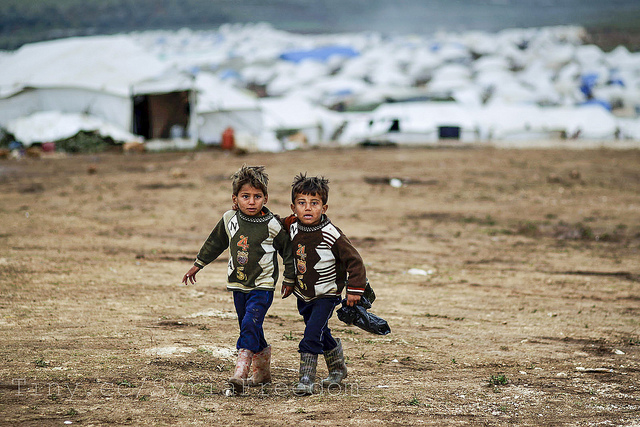Chip in to keep stories like these coming.
Summertime, and the livin’ for most Canadians is easy, though not of course if you live in large chunks of Western Canada, where flames are jumping and the fire is high. But most of us don’t.
Geography is destiny in other ways as well. Just check any country in Europe or Africa or the Middle East. Most are surrounded on all sides by other countries, which significantly increases the risk of trouble. We have only the menace of the U.S.A. on our border.
Being cossetted by three great oceans, unlike most of the world’s 200-odd nations, we are spared direct involvement in the great twin crises of the moment — the emergence of a violently proselytizing Islam and vast migrations of people. Even with Stephen Harper’s token contribution to the war against the Islamic State, few Canadians are touched in any way by these devastating challenges. For us, it’s a kind of permanent vacation from the world. We’re bystanders at best. It feels to me like an abdication of responsibility. Because there’s a real role for Canada here.
We should applaud President Barack Obama’s sensible reluctance to send many more U.S. troops to take on ISIS directly. He knows perfectly well that foreign boots on Muslim lands over recent decades has been a sure recipe for backlash and increased radicalization. But Stephen Harper’s position is inscrutable. Since he insistently warns of the imminent danger to both world peace and the safety of my grandkids, you’d think he’d try to do something more than dispatch a token Canadian force to Iraq and ignore Syria altogether.
You’d think, for example, that he might open Canada’s doors to more than 10,000 Syrian refugees and 3,000 Iraqi refugees over the next three years. Like our ISIS contribution, the numbers are derisory compared to the need, though taking more refugees would be infinitely more productive than sending more troops. Worse, the government itself will support only 4,000 of those Syrians (if they’re permitted to come at all); the other 6,000 must be supported by private sponsors like refugee advocacy groups or religious organizations. But because many of then have lost all or most of their government funding, few now have the resources to take care of new refugees from Syria. It’s Stephen Harper’s own sweet little Catch-22.
Still, we should thank our lucky stars that we’re not more directly affected by these disasters. No one has a clue how to deal in the long run with the unprecedented movements of millions away from their impoverished or war-wracked homelands, or the implacable war within Islam between Sunnis and Shia which occasionally turns against the Western world.
That’s the thing about the migration and ISIS crises. They’re huge, they’re related, and they seem intractable. We know the countries from which the majority of migrants are fleeing, and they are well worth fleeing from. They’re either in turmoil from conflict (caused by ISIS, or us) or they’re desperately poor, or both. In either case, we’re at a dead end. We’ve shown we can’t defeat ISIS and we can’t — or don’t have the will — to help poor countries develop quickly.
Nor are Western European countries prepared to be inundated further by many tens of thousands of these refugees and frankly, no one can realistically expect them to do so. For them too, geography is destiny. More precisely, for Italy, Greece, Spain, Turkey, Jordan, geography is tyranny. There’s no good reason why they should be taking the brunt of the exodus except for the accident of propinquity: They’re physically closer to the sources of migration. That’s why Canada needs to do more.
In the meantime, Africans and Middle Easterners will continue to flee their homes in huge numbers while the Western alliance fighting ISIS has largely been unable either to stop its advances or to mitigate its sadistic behaviour. Here’s where the position of the West is most mulish. The United States, Canada and the rest of the alliance knew before they took on ISIS militarily that it could not be defeated by air power alone. They all said as much. Yet air power is just about all that’s being mobilized. Now that we’ve been at it for almost a year, it’s perfectly clear that the original assessment was correct. Air power alone is not nearly sufficient, as ISIS’ continued evolution and military successes demonstrate. So everyone is offering training to local armies. But the West has been training these armies for decades with little perceptible progress, as we saw in Afghanistan and Iraq and still see today.
As for countering ISIS, it’s only too obvious there are no quick fixes. But in Canada we’re not even having a discussion, let alone a debate. Yet from a flood of new books and articles, I conclude that the Muslim world itself will have to resolve this terrible internecine conflict that has riven it. But it’s not at all clear they have the means or will to do so. It’s at least plausible that a serious Canadian government could offer its good offices to enable Muslim groups to play this critical role more actively. In any event, it couldn’t be much more of a waste of time and resources than our present contribution. But it’s one from which Mr. Harper has totally disqualified us.
Have a great lazy, hazy, crazy summer day.
This article originally appeared in The Globe and Mail
Image: Flickr/Freedom House
Chip in to keep stories like these coming.




